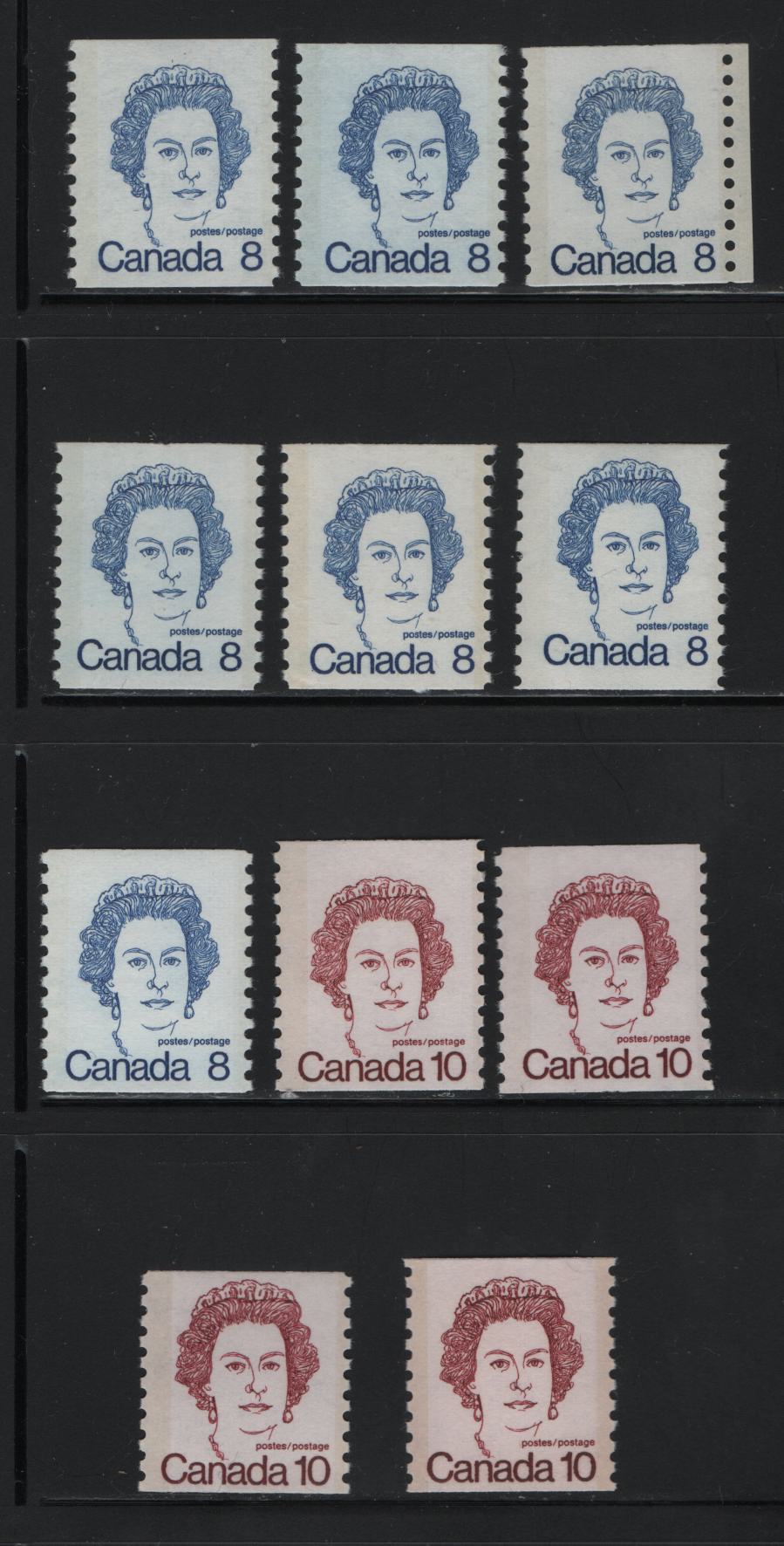Brixton Chrome
Canada #604-605ii 8c & 10c Milky Blue & Dark Carmine Queen Elizabeth II, 1973-1978 Caricature Issue, 11 VFNH Coil Singles Covering A Wide Range Of Paper Types
Canada #604-605ii 8c & 10c Milky Blue & Dark Carmine Queen Elizabeth II, 1973-1978 Caricature Issue, 11 VFNH Coil Singles Covering A Wide Range Of Paper Types
Couldn't load pickup availability
11 VFNH coil singles of the 8c & 10c milky blue & dark carmine Queen Elizabeth II from the 1973-1978 Caricature Issue covering a wide range of paper types. Includes the following: (1) milky blue on LF4/LF4 smooth paper with invisible tagging; (2) milky blue on LF4/LF4 bluish tinted smooth paper with invisible tagging; (3) milky blue on DF1/DF2 smooth paper with invisible tagging; (4) milky blue on DF2/LF4 smooth paper with invisible tagging (unlisted); (5) milky blue on LF4/LF4 smooth paper with light tagging; (6) milky blue on HF8/HF8 smooth paper with invisible tagging; (7) milky blue on HB12/HB12 smooth paper with invisible tagging; (8) dark carmine on DF2/DF2 smooth paper, with light tagging; (9) dark carmine on DF2/DF2 smooth paper with invisible tagging; (10) dark carmine, short coil on DF2/DF2 smooth paper with moderate tagging; (11) dark carmine shirt coil on NF/NF smooth rose tinted paper with moderate tagging
Unitrade values this at $9.1, treating the unlisted varieties as the closest equivalent listed varieties. The stamps offered here grade 75-80 as follows:
Centering/Margins: 45/70, 50/70
Paper Freshness: 5/5
Colour: 5/5
Impression: 5/5
Absence of Visible Paper Flaws: 5/5
Perforations: 10/10
The low value caricature stamps were printed by both BABN and CBN. BABN produced most printings of the 7c and 8c, and all the booklet stamps. CBN produced all the other stamps. Unitrade has made a good attempt at classifying the printings of these stamps, but there are some fluorescent front/back combinations that are NOT listed. In addition, there are three aspects that they have completely ignored, which deserve attention by specialists. The first of these are shades. Most of the stamps exist in at least two, or sometimes three subtle shades of the basic colours. The second aspect that is worthy of attention is the appearance of the tagging, in terms of how dark the bands are on the stamps in normal light. On the CBN printings, the tagging ranges from light, which is almost invisible, to dark, where the bands are deep brownish yellow. On the BABN printings, the tagging ranges from invisible, to visible but colourless, to azure or rose, where the ink has coloured the taggant. The third aspect, that deserves some study is the paper texture. On the CBN printings, there is smooth paper, which has an almost plate glazed appearance on the print side. Then there is a semi-smooth paper, which is not ribbed, but is somewhat rough on the printed surface. Then, there is the horizontal ribbed paper, that is listed in the catalogue. Then, there is a vertical ribbed paper. The ribbing on this paper is not obvious, but is visible when the paper is viewed through backlighting. The BABN printings exist on this paper also. There is also a vertical ribbed paper on some of the BABN booklets where the ribbing is on the gum only. Finally, there is a vertically ribbed paper with a rough surface, which is most commonly found on the plate 3 printings of the 6c. In terms of pricing, Unitrade is hopeless on this set. There are varieties, such as the 1c on HF paper and the 7c on MF paper that I have NEVER seen before this sale, even after breaking down advanced collections of this issue. In this sale I am offering the first ever example of the 7c on HB paper: one that is mint no gum, and a VF used 1c on HF paper. Then, there are others, such as many of the NF papers, DF papers and HF papers on other values, where you will only find a small handfull after going through hundreds or thousands of stamps. I ask you: how can they be worth 35 cents or 50 cents? By far the most common paper, which will account for 80-90% of the mint stamps is a low fluorescent to MF paper (LF3 to MF6) on both sides. Everything else is scarce to very scarce, and most stamps should really be worth a minimum of $5 per stamp, with some as much as $25 (the 1c HF and 7c MF for example).
Share


